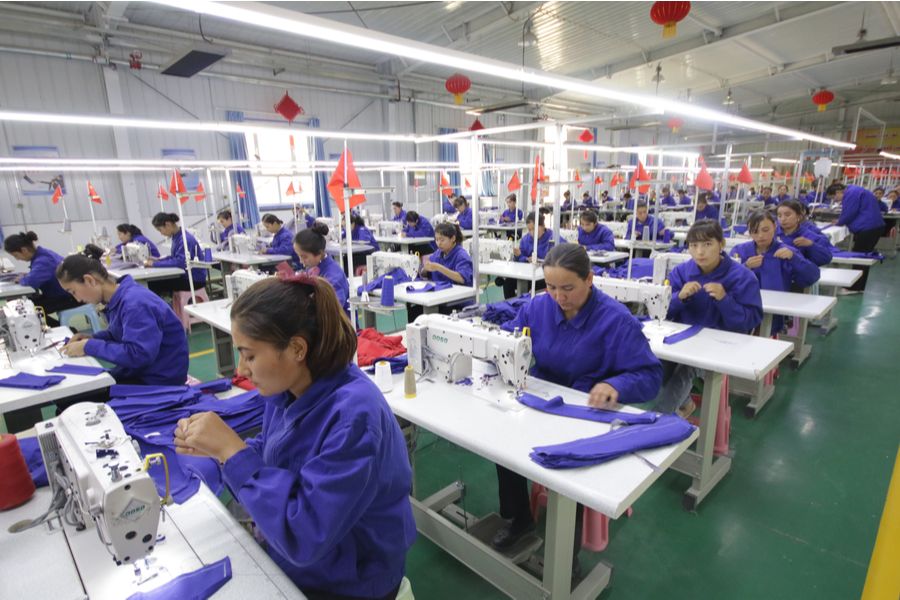Author Herbert Rothschild has stated that global corporations must be held accountable for supply chains built on forced labor, particularly Uyghur forced labor.
Turkistan Times, June 7, 2025, Istanbul: In an article titled "Relocations: Supply chains tainted by forced and child labor," published on June 6, 2025, on the American news site "Ashland.news," Herbert Rothschild argued that in a globalized economy, it is impossible for consumers to remain free from forced labor. He particularly noted that China's policy of forced labor against Uyghurs has severely tainted the global supply chain. In his article, Rothschild emphasized the responsibility of global corporations in this matter and called for strengthening oversight and legal measures.
Uyghur Forced Labor and the Complicity of International Corporations
In his article, the author pointed out that the Chinese government is compelling Uyghurs and other Turkic peoples in East Turkistan to work in "conditions approaching slavery," calling it part of its "unconscionable treatment" of them. According to Rothschild, China not only forces Uyghurs to work in the cotton fields of East Turkistan and in factories inside or near "re-education" camps but also forcibly transfers them to factories across the country.
Rothschild specifically mentioned that the Chinese online retail platform Temu sources goods made with Uyghur forced labor, and the fast-fashion brand Shein uses cotton from East Turkistan. He explained that although the U.S. passed the "Uyghur Forced Labor Prevention Act" in 2022, these companies long evaded the law by exploiting the "de minimis rule," which exempts packages valued at less than $800 from customs inspection. However, the situation changed when the Trump administration abolished this exemption.
The author demonstrated that this issue is not limited to Chinese companies, citing a report from the Australian Strategic Policy Institute titled "Uyghurs for Sale" to prove that American and European companies are also involved. According to the report, "Uyghur forced labor exists in the supply chains of at least 82 well-known global brands, including Apple, BMW, Gap, Nike, Samsung, and Volkswagen."
Shift in Supply Chains Creates New Problems
In his article, Rothschild argued that due to the U.S.-China trade war, many companies are shifting their production from China to countries like India and Vietnam, but this is akin to "jumping from the frying pan into the fire" rather than solving the problem. In his view, although there is no state-sponsored forced labor in India, the "Global Slavery Index" estimated that in 2018, approximately 8 million people were living in conditions of slavery in the country.
Citing Apple's decision to move its iPhone production to India as an example, the author noted that its Chinese partner, Foxconn, known for its poor treatment of workers, is making significant investments in India. Therefore, he stressed that "without strict scrutiny, these companies are unlikely to behave well in new locations."
A Call to Strengthen Legal Oversight
At the end of his article, Herbert Rothschild asserted that since maximizing profit is the core tenet of the capitalist system, the only reliable check on corporate misconduct is "oversight with severe consequences." He criticized the inadequacy of current oversight mechanisms. For instance, he pointed out that the list compiled by the U.S. Department of Labor's Bureau of International Labor Affairs [ILAB] does not include brand names of products linked to forced labor and lacks any enforcement power over companies. He also noted that California's 2010 "Transparency in Supply Chains Act" only requires disclosure and imposes no penalties.
The author concluded by expressing his support for the global movement to strengthen laws that penalize companies involved in forced labor. He called on the state of Oregon to pass a law similar to California's but with more robust "enforcement tools" and added that he hopes Nike's founder, Phil Knight, will support this effort to authenticate his company's "fair labor" pledge.
Source: Ashland News

